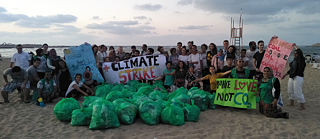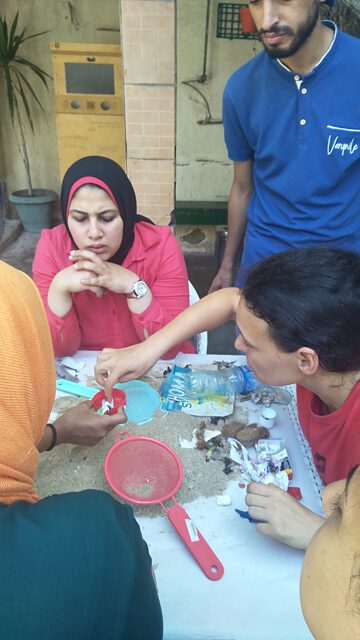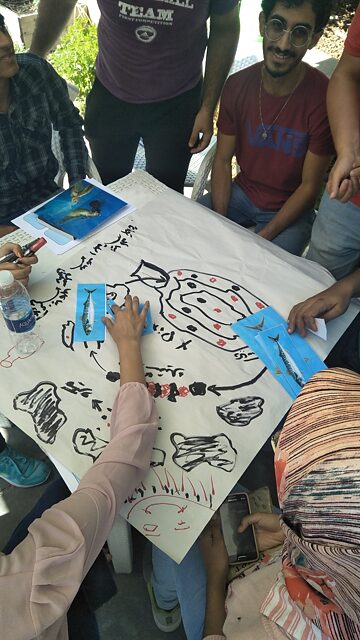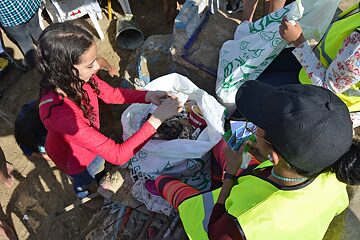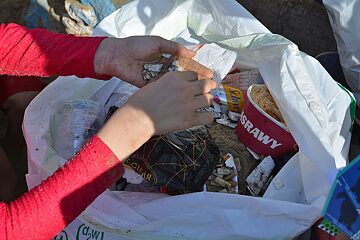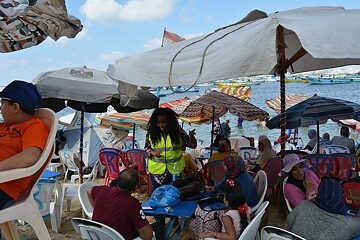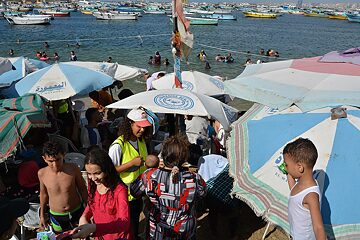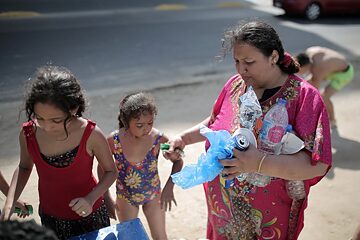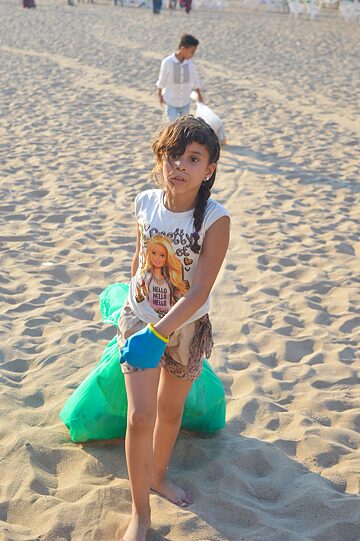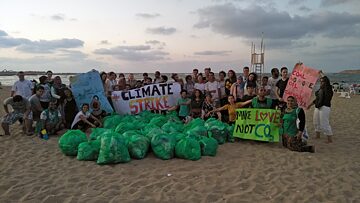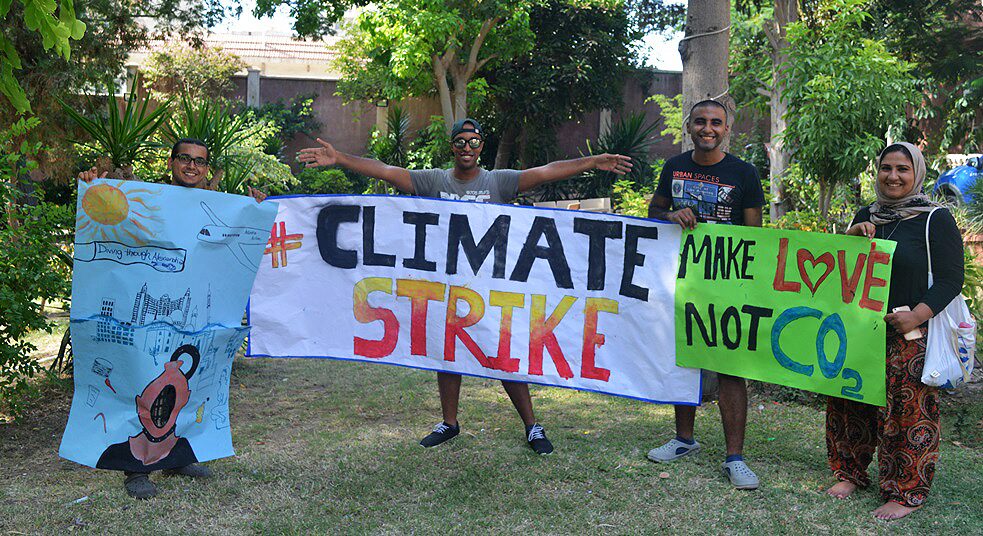Has it ever crossed your mind that you are eating plastic on a daily basis? That you are drinking it? Apart from the thousands of trending pictures and videos on social media of animals and fish tangled in plastic, or even filled with plastic, are you aware that 83 % of our tap water contains microplastics?
Plastic never disintegrates; it breaks into pieces smaller than 2.5 mm, known as microplastics, and becomes part of our food chain. This can happen through either of two scenarios: First, the water we drink is polluted with microplastics, causing numerous carcinogenic diseases and hormonal disturbances; second, animals accidently ingest plastic, unable to distinguish it from real food, then pass it on to us when we consume them. In developing countries like Egypt, where cattle are often reared in the wild and in landfills, which are full of plastic, it is not hard to imagine that the material is part of their daily diet. Even when we keep them on farms and have more control, their feed will most likely contain plastic – this is the reality in Egypt as anywhere else in the world.The problem does not lie in plastic itself, but in single-use plastics. While plastic is an extremely useful and versatile material that is part of almost everything we use in our daily lives – our laptops, mobiles, clothes, electrical insulation, and an infinite array of other objects – single-use plastics might serve us for a few seconds or minutes, but stay in our environment for up to 450 years and end up in our oceans. Single-use plastics, such as disposable plastic bags, plates, cups, and bottles, are made of very light material. It only takes a slight breeze for them to take off and float into the nearest water channel, finding their way to the sea, and then to the ocean. Twelve billion plastic bags were produced in Egypt in 2017 – let that sink in.
Ban Plastic Movement: Why We Have to Do it Now
Alexandria is not only the largest coastal city in Egypt, but also the one most affected by marine litter: hence, the perfect spot for the Banlastic team to initiate the plastic ban movement in Egypt, joining more than 70 other countries that have taken measures towards achieving a plastic ban. If the effects of plastic on marine life and general aesthetics are not reasons enough, plastic items also fly around to clog rain drains, causing floods in the winter season. The disruption of the ecosystem is another aspect of this disaster. In summer 2017, a huge number of jellyfish invaded the north coast and kept disgruntled beachgoers out of the water. If you wonder what this has to do with single-use plastics, here is the explanation: Turtles feed on jellyfish. When in water, jellyfish look very similar to plastic bags, so turtles mistakenly eat plastic bags, which causes them to choke and die miserably. This has disrupted the whole ecosystem and contributed to a list of factors why sea turtles are under the threat of extinction. This was the main motive for us to start Banlastic Egypt in this city.
How Effective Are Actions like Beach Clean-Ups?
It is debated in environmental circles and otherwise whether beach clean-ups help solving the litter problem while seaside visitors continue littering all the same. Without changing the culture, how would our clean-ups make any change? However, some people argue that clean-ups can be considered peaceful green demonstrations to draw beach visitors’ attention to the harms of littering and the beauty of clean beaches. Indirectly, clean-ups create social pressure on those who litter. They are challenging the underlying acceptability of littering and contribute to normalising anti-littering attitudes. If people feel their actions could attract social condemnation, they are less likely to do it. The other part of the equation is the government. Clean-ups can push the government to increase their efforts in keeping our shores clean, by providing more bins and banning single-use plastics at beaches, and then gradually in other contexts, such as supermarkets.
On a similar note, plastic pollution does not just affect marine life: It has an impact on our fresh water, as well, when plastic reaches landfills, most of which are unregulated in Egypt with no proper ground insulation. With the existence of a number of other factors, including sun, heat, aerobic bacteria growth, and organic waste reaction, plastic starts to break down, leaching into the soil and polluting ground water. If used for drinking or irrigation later on, it can lead to many health problems. In addition, the accumulation of plastic waste in water canals and in soil increases the evaporation rate, and thus further contributes to the water scarcity the region is already facing. This is because when it accumulates in soil, it creates free channels for water movement and exposure to the atmosphere. Plastic accumulation in canals decreases the overall water flow and therefore increases the chance for water to evaporate before reaching the lands it is supposed to irrigate.
Our Water Resources Are at Stake
The problem does not stop here. The industry of bottled and packaged mineral water is a major actor in this crisis. It is manufacturing plastic rather than water. Each litre of bottled water requires the use of three litres of fresh water in the manufacturing process of the plastic bottle. The whole industry of bottled water and soft drinks does not only pollute the environment, but also exacerbates the water crisis. Water bottling companies dig very deep bore wells in remote villages to pump water, which leads to a shortage of the water necessary for drinking and agriculture. The situation is especially dramatic in remote areas where people do not have access to the technology required to extract water from great depths to meet their daily needs.
The village of Plachimada in Kerala, India, is an ideal example. A Coca-Cola factory used the village’s ground water to manufacture plastic bottles and released it back to its surrounding rivers, which led to the decline of ground water used for irrigation, as well as to the pollution of drinking water. The Panchayat, the village council, raised a case at the Supreme Court to stop the factory’s operations. To win the case, they had to support their claim with scientific evidence. Many lobbyists and different parties were involved in the process until, finally, the village won the case with the support of international research institutes. Undoubtedly, this story is not the first nor the last. It is quite common for villages around the world to struggle to stand up to big companies who are draining, depleting, or polluting their natural resources and impede their access to clean water – all in the service of manufacturing single-use plastics.
Most of our marine litter could easily be avoided by boycotting single-use plastics. Let’s go back to the practical wisdom of our grandmothers: bring our own container to buy ful (beans), use a net for our balady bread, shop with our fabric bags, refill our glass bottles, and, last but not least, boycott such nonsense as plastic straws – or, if you have to, why not use stainless steel, paper, or bamboo straws?
Next time you buy a single-use plastic water bottle or consume food wrapped in plastic, ask yourself: Will I enjoy my plastic meal today?!
December 2019
